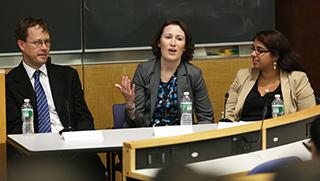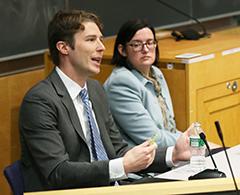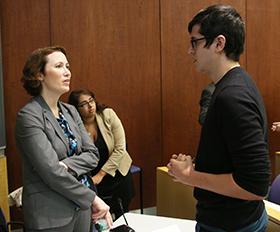Graduates Share Advice on Careers in U.S. Attorneys Office
Students Learn More About Role of Prosecutors and What It Means to Be an Advocate for the People.
New York, November 21, 2014—Four Columbia Law School alumni currently working in the civil and criminal divisions of the U.S. Attorney’s Office for the Southern District of New York returned to campus Nov. 12 to discuss their work, and respective career paths, with students.
(l-r) Benjamin H. Torrance '00, Amy Lester '02, and moderator Kiran Singh of Social Justice Initiatives |
Margaret Garnett ’00, co-chief of the Violent and Organized Crime Unit, Benjamin H. Torrance ’00, chief appellate attorney in the Civil Division, Amy Lester ’02, assistant U.S. Attorney in the Securities and Commodities Fraud Unit, and Caleb Hayes-Deats ’11, assistant U.S. Attorney in the Civil Division, were brought together by Social Justice Initiatives (SJI) to share advice with students on how to find a career in federal prosecution. Kiran Singh, associate director of SJI, moderated the conversation.
The panelists suggested students devote themselves to courses at the Law School that provide the most practical experience.
“The only way to learn to practice law is to practice it,” said Torrance, who joined the U.S. Attorney’s Office in 2002.
| Caleb Hayes-Deats '11 and Margaret Garnett '00 |
“The most valuable things that helped me were the opportunities Columbia Law School offered for internships and externships,” added Garnett. “Take every chance you can to go to a place where real lawyers are working.”
In addition to practical experience, the four panelists also stressed the importance of clerking, and how it translates to their work. Though not a prerequisite to earning a job in the U.S. Attorney’s Office, the experience clerking provides does make a candidate more attractive, Garnett said.
“Clerking gives you some sense of what the job is and some sense of what happens in a federal district court,” she said.
Garnett and Lester, both members of the criminal division, also worked at law firms before they moved to the U.S. Attorney’s Office, and they dismissed the idea that young lawyers have to choose between working at a firm or in the government sector.
“A firm can be a great place to learn—there are lots of resources at your disposal,” said Lester, who served as an associate at two law firms in New York City before becoming a prosecutor.
Still, students shouldn’t “be so prestige focused,” said Garnett, who practiced law at Wachtell, Lipton, Rosen and Katz. “It’s terrible to be the 10th associate on the highest profile case at your firm. It’s better to get the chance to do stuff.”
| Amy Lester '02 talks with a student about career paths in the U.S. Attorney's Office. |
All the panelists agreed there is no such thing as a typical day in the U.S. Attorney’s Office. In the Civil Division, Hayes-Deats said he works on a wide range of cases: from civil rights issues and Americans with Disabilities Act investigations to bankruptcy matters and environmental protection.
“We really don’t serve a particular client, we serve everyone,” he explained. On the criminal side, Garnett said assistant U.S. attorneys spend more time in the courtroom.
“You’re an advocate,” she added. “In every decision we make, the guiding principle is: ‘Is this just?’”
Executive Assistant U.S. Attorney for the Southern District Neil Corwin, who oversees hiring in the U.S. Attorney’s Office, was also on hand to answer students’ questions about internships and potential permanent employment after graduation.
Executive Assistant U.S. Attorney for the Southern District Neil Corwin, who oversees hiring in the U.S. Attorney’s Office, was also on hand to answer students’ questions about internships and potential permanent employment after graduation.


